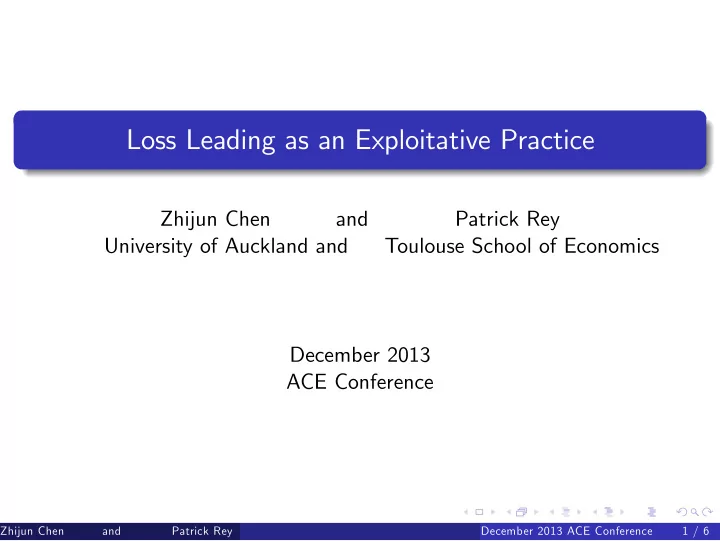

Loss Leading as an Exploitative Practice Zhijun Chen and Patrick Rey University of Auckland and Toulouse School of Economics December 2013 ACE Conference Zhijun Chen and Patrick Rey University of Auckland and Toulouse School of Economics December 2013 ACE Conference 1 / 6
Loss Leading in Retailing Large retailers often adopt loss leading strategies UK: adopted by 90% of large retailers, 6% of turnover Concerns: smaller rivals, consumers Competition Commission (2000): hard discounters Similar concerns raised by OFT and FTC Dilemma in antitrust Not predatory: Persistent below-cost pricing Statutes on below-cost resale (50/50 in the EU & US) What type of abuse, if any? Zhijun Chen and Patrick Rey University of Auckland and Toulouse School of Economics December 2013 ACE Conference 2 / 6
A Simple Example Large retailer L offers two products, A and B u A = 10 and c A = 0 u B = 6 and c B = 4 Consumers have heterogeneous shopping costs Half with s = 4 Half with s = 0 Monopoly outcome L sells both A and B to all consumers at p m = 16 − 4 = 12 Monopoly profit π m = 8 Zhijun Chen and Patrick Rey University of Auckland and Toulouse School of Economics December 2013 ACE Conference 3 / 6
Simple Example Now a competitive fringe S also offers B at p S = 2 L then adopts loss leading: p B = 2 < c B = 4 and p A = 10 O ne- S top S hoppers ( s = 4 ) still buy both from L M ulti- S top S hoppers ( s = 0) buy A from L and B from S Pricing strategy L can charge same margin from OSS : r AL = 12 − 4 = 8 And a higher margin on MSS : r A = 10 > 8 → Higher profit than in monopoly: π L = 9 > π m = 8 − Zhijun Chen and Patrick Rey University of Auckland and Toulouse School of Economics December 2013 ACE Conference 4 / 6
Main Insights Loss leading as an exploitative rather than an exclusionary strategy It allows L to extract extra surplus from consumers Discriminates MSS from OSS Hurts smaller rivals as a by-product — but needs them! Banning loss leading Hurts large firm Benefits consumers, smaller rivals and society Zhijun Chen and Patrick Rey University of Auckland and Toulouse School of Economics December 2013 ACE Conference 5 / 6
Robustness and Application Robust in a variety of dimensions general distribution of consumers’ shopping costs elastic demand for A and/or B imperfect competition on A and/or B A and B being (imperfect) substitutes or complements Applies to other cases with heterogeneous transaction costs Aerospatiale-Alenia/De Havilland Microsoft Zhijun Chen and Patrick Rey University of Auckland and Toulouse School of Economics December 2013 ACE Conference 6 / 6
Recommend
More recommend